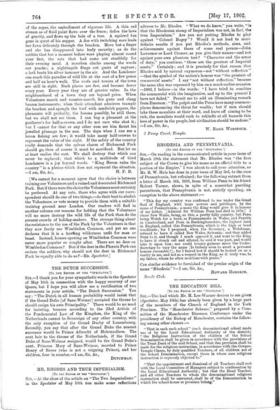MR. RHODES AND TRUE IMPERIALISM.
[To TUE EDITOR OP TIER "SPECTATOR.1
SIT.,—At the close of the article on "The Two Imperialisms " in the Spectator of May 10th you make some reflections adverse to Mr. Rhodes. " What we do know," you write, "is that the Rhodesian stamp of Imperialism was not, in fact, the true Imperialism." Are you not putting Rhodes to play against " Colonel Bogey" ? Would it not lead to more definite results if you put Rhodes's methods, aims, and achievements against those of some real person—John Lawrence or Lord Cromer, as you give their names—and not against your own phantom test ? " Character and the sense of duty," you continue, " those are the greatest of Imperial assets." Certainly ; and it is precisely for that reason that Rhodes said by natural oxymoron—not "without reflection" —that the symbol of the nation's honour was "the greatest of commercial assets." I say "not without reflection," because the same idea was expressed by him on a much earlier occasion —1893, I believe—in the words : " I have tried to combine the commercial with the imaginative, and up to the present I have not failed." Permit me to add an illuminating remark from Emerson : " The pulpit and the Press have many common- places denouncing the thirst for wealth; but if men should take these moralists at their word, and leave off aiming to be rich, the moralists would rush to rekindle at all hazards this love of power in the people, lest civilisation should be undone." —I am, Sir, &c.,
2 Pump Court, Temple. W. BASIL WORSFOLD.






































 Previous page
Previous page